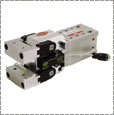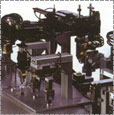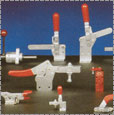|
De-Sta-Co Industries (DSCI) of Michigan is a good example of a long-time Dover company that has achieved success by building on its original product lines through a series of strategic expansion activities.

|
DSCI is one of two Dover companies with the De-Sta-Co name. Begun as the Detroit Stamping Company in 1915, it grew rapidly based on the development and patenting of the world’s first toggle clamp in 1936, and took the first steps toward global expansion in 1958 with the opening of De-Sta-Co Metallerzeugnisse GmbH. By the time Dover acquired De-Sta-Co in 1962, the company boasted a global reputation for excellence in both stamping and in clamping technology.
In the late 1980’s, the company expanded operations into the Pacific Rim, but by 1997 differing strategic objectives led the company to split itself into two independent entities—De-Sta-Co Manufacturing (DSCM) and DE-STA-CO Industries. DSCM makes reed valves for compressors, stamped precision components, blower housings and specialized aluminum tubular products. DSCI manufactures workholding and material movement devices in both manual and automated form.
According to DSCI president, Jon H. Simpson, the company is growing because of the progression of product offerings from individual manual clamping devices to a full-range of flexible and automated systems solutions. And it has been the careful selection and acquisition of complementary product lines that supports this growth.
First Steps to Automation DSCI’s first steps to providing automated solutions began in 1994, with the acquisition of the cylinders product line. In 1996, DE-STA-CO made an even more critical acquisition with the addition of Robohand.
Nicky Borcea and Alexander Ionescu, entrepreneurial and innovative Romanian immigrants, founded Robohand in 1982. Based in Monroe, Connecticut, the company manufactured grippers, slides, and other modular components used to automate a variety of manufacturing tasks. Robohand’s well-engineered products, sold by an experienced and aggressive sales organization, soon earned a position of market leadership.
By 1995, the partners began to consider future options. Borcea wanted to help build Robohand’s market position in Europe while pursuing other interests. Ionescu preferred to remain at Robohand where he could devote his talents to engineering innovation.
It was clear during Dover’s initial visit to Robohand in October 1995, that Robohand and DSCI were a good fit. Bill Rogerson, then president of DSCI, and Robohand’s two founders agreed that the potential for growth for both companies would be greatly expanded by combining operations. In February 1996, Robohand became an independent company within DSCI. The two companies continued to market their products as separate entities in North America. In Europe, Robohand growth was spurred by marketing the products through DSCI’s factory direct sales force. In 2001, however, the gap between the two companies’ marketing strategy disappeared as the market synergy between the business units was realized. One sales force now delivers the full range of products and system solutions—from all manual clamps to fully automated robotic products and systems solutions.
"Acquiring Robohand was a key piece in developing our growth platform," said Simpson. "It was the beginning of our ability to provide customers with flexible automation systems solutions."
"We had grown rapidly at Robohand and had increasing needs for capital expenditures," Ionescu said. "Dover not only provided all the financial answers and helped us double the size of our manufacturing operations, but also allowed us to continue our own proven and successful way of doing business."
|
|
|
|
"The strength of DE-STA-CO Industries begins with the individual business units and culminates in our unified ability to provide flexible automation solutions to a global customer base."
Jon Simpson, President |
|
|
"We had grown rapidly at Robohand and had increasing needs for capital expenditures. Dover not only provided all the financial answers but allowed us to continue our own proven and successful way of doing business."
Alex Ionescu, Co-founder and President, Robohand
|
|


|
More Acquisitions
DE-STA-CO Industries didn’t end its acquisitions with Robohand. In the ensuing five years, four more acquisitions have expanded product offerings, geographical presence, and customer base. The first of these is EOA Systems of Dallas, Texas. EOA, acquired in 1997, is a mid-sized manufacturer of robotics accessories—including innovative end-of-arm tooling. The next, in 1998, was Groupe CCMOP, the leading French manufacturer of robotic grippers, compliance modules, clutches and other robotic peripherals. CCMOP products complemented the Robohand line, and are marketed through Robohand in North America.
In 1999, DSCI expanded into South America with the purchase of EMA—the leading provider of manual clamping solutions in that market. Once again, the product line complemented existing offerings, and since the acquisition was completed, DE-STA-CO EMA capabilities have grown to support the creation of automated systems for customers. The last acquisition, in January 2001, was CPI Products of Plymouth, Michigan. CPI specialized in manufacturing end effector systems for automotive stamping applications, but their full product line, including transfer press tooling, supports both traditional markets and the strategic objective of providing flexible automation systems solutions to industrial markets.
Conclusion
Each acquisition has contributed to DE-STA-CO Industries’ strategic growth. The depth and range of product lines is unequalled by any competitor. The ability to pull from these lines to create full systems solutions also gives DSCI a competitive edge, by supporting expansion into new markets such as medical, electronics, plastics, and packaging. Acquisitions in Europe and South America also strengthened DSCI’s role as a global supplier.
“Going
forward—with the integration of manufacturing, sales, and marketing
initiatives—DE-STA-CO Industries is as flexible a unit as the system
solutions it provides to customers,” said Simpson.
|
|
|